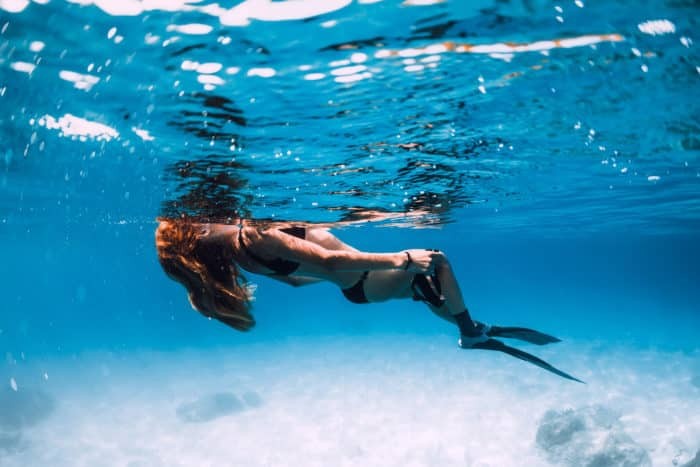How often have you been so anxious and nervous about the future, or so saddened or upset by something in the past, that it caused you to completely miss out on what exactly is happening in the present? This is the opposite of mindfulness.
Mindfulness is a term that is often associated with yoga or meditation. Mindful.org defines mindfulness as “the basic human ability to be fully present, aware of where we are and what we’re doing, and not overly reactive or overwhelmed by what’s going on around us.” While it is definitely useful for yoga and meditation, mindfulness also has a place in freediving. Mindfulness encompasses awareness, relaxation, and acceptance, all of which are essential parts of freediving.
Awareness
Freediving requires awareness. You need to be in tune with your body, your thoughts, your feelings, stay in the present moment, and maintain concentration. If your thoughts are on the fight you had with your partner earlier that day, or on the giant to-do list you have waiting for you back home, you are not in the present moment, and you may miss hearing the signals your body is giving you, or even hear the wrong ones. You need to be completely aware in the present moment when freediving. What does the water feel like against your skin? What do you hear underwater? Are your muscles tense? These are thoughts that can go through your mind, as long as you do not dwell on them, just merely observe them. You are feeling everything as it is happening, you understand what is going on around you, and your mind is completely in tune with your body and surroundings.
Relaxation

Relaxation is one of the most important aspects of freediving. Without relaxation, equalization can suffer, injuries can occur, and oxygen can burn faster. Techniques like belly-breathing, the body scan, and visualization are all techniques that can aid in being relaxed and mindful. These techniques are distraction techniques; if you have trouble focusing your thoughts on the present moment (as written above) because your mind is too busy with other things, focusing on something else within your body can relax not only your mind but your body as well. When our brains detect stress, our sympathetic nervous system engages: our heart speeds up, metabolism increases, and more oxygen is consumed. But if we relax our minds, and in turn our bodies, oxygen consumption is low, our internal organs are protected, and equalization can feel like a breeze.
Acceptance
Being mindful means being accepting. If you are having trouble clearing your mind from busy thoughts, try letting them play in your head, and then accepting them instead of dwelling on them. Some people can get caught in a negative thought pattern; a conversation in your head during a dive can go Crap, how am I getting contractions so early? I haven’t even turned yet…how deep am I, anyway? Maybe it was my last breath, maybe I was not relaxed enough. Why is this happening so often lately? Maybe I need to work out more? Could it be my diet? Do those two things even have anything to do with contractions?
Dwelling on an issue will remove any relaxation you already established, and send your mind spinning in an unhelpful, negative loop. This will impact your dive, your mood, and possibly future dives if you really dwell on the past. Acceptance does not mean you have full control over your thoughts, it just means that you control how you respond to thoughts. So if you get a weird thought in your head on a dive (such as how annoying contractions are), or even during the relaxation phase before a dive, observe that this particular thought is going in your head, and then let it go. Get back to being mindful, observe your sensations or use distraction techniques like those listed above.
Use mindfulness out of the water
You do not have to keep mindfulness only to freediving or meditation, try it out in regular life. The next time that you are arguing with your friend or partner, stuck in a frustrating situation, or anxious about something you cannot control, try being mindful. Be aware of your thoughts and feelings as if you are distantly observing them, and stay in the present moment instead of living in the past or future. Use a relaxation technique if you are feeling particularly tense, angry, or worried. Accept that you cannot always control an outcome, and realize that worrying about something will not make it any less bad when and if it actually does happen.
Applying mindfulness to your freediving training can increase your performance and overall experience in the water while applying mindfulness to life in general can positively affect your mental and physical well-being. Consider making a meaningful change with mindfulness, not only in your hobby but in life as well.

